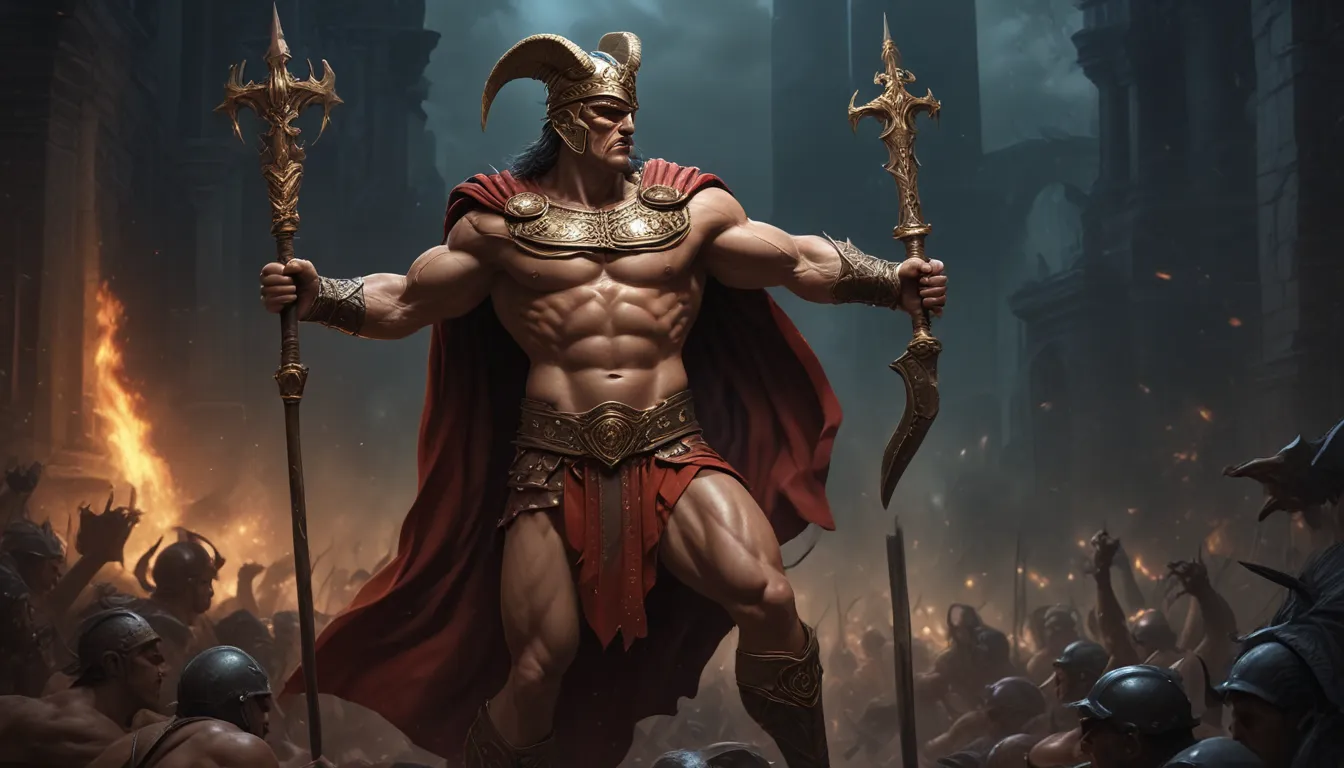The images in our articles may not match the content exactly. They are used to grab your attention, not to show the exact details in the text. The images complement the text but do not replace it.
Greek mythology is a treasure trove of captivating stories that shed light on the complexities of human nature and the divine realm. Among the pantheon of Greek gods and goddesses, Ares, the god of war, stands out as a figure of both fascination and fear. Known for his impulsive and aggressive nature, Ares played a significant role in ancient tales of battle and conflict, weaving a rich tapestry of myths that continue to captivate scholars and enthusiasts alike. In this exploration of the enigmatic god of war, we delve into 20 intriguing facts about Ares that offer a deeper understanding of his character, relationships with other deities, and his enduring legacy in ancient Greek culture.
Ares: The War Deity of the Olympian Pantheon
Ares, one of the Twelve Olympian gods, held sway over the realm of war and conflict in Greek mythology. Often depicted as a brutal and bloodthirsty deity, Ares embodied the raw and untamed aspects of warfare, contrasting the strategic and disciplined approach of Athena, the goddess of wisdom and warfare. His association with physical strength and his role as a patron of warriors seeking courage in battle cemented his reputation as a formidable and intimidating figure in the ancient Greek world.
Parentage and Lineage of Ares
As the son of Zeus, the king of the gods, and Hera, the queen of the Olympian deities, Ares boasted a lineage of power and influence among the divine pantheon. His parentage from two such prominent figures contributed to his domineering and formidable nature, shaping his character as a god of war and conflict. Ares’ complex relationship with his parents, particularly his mother Hera, played a significant role in shaping his mythological narrative.
Companions of Fear and Terror: Phobos and Deimos
Ares’ association with fear and terror was further emphasized by his constant companions, Phobos (Fear) and Deimos (Terror). These personifications of dread and terror underscored Ares’ reputation as a deity who instilled fear in the hearts of mortals and immortals alike. The presence of Phobos and Deimos by his side highlighted the formidable and intimidating nature of the god of war, reinforcing his role as a force to be reckoned with in the world of Greek mythology.
The Impulsive and Aggressive Nature of Ares
In contrast to the strategic and disciplined approach of Athena, Ares was characterized by his impulsive and aggressive nature. Known for his propensity for violence and chaos, Ares often acted on impulse, leading to unpredictable outcomes in conflicts and battles. His volatile and hot-tempered demeanor set him apart from other deities, earning him a reputation as a deity who thrived on the raw and chaotic aspects of warfare.
Iconic Imagery: Ares in Battle Regalia
Ares’ iconic portrayal often featured him wearing armor and wielding a spear or sword, symbols of his martial prowess and dominion over the realm of war. Clad in battle regalia, Ares embodied the brutal and combative aspects of conflict, underscoring his association with the physicality and brutality of war. The imagery of Ares in full battle attire captured the essence of his fearsome and formidable nature as the god of war.
Love Affairs and Offspring of Ares
Despite his role as a deity of war, Ares was not devoid of romantic entanglements. His love affairs resulted in the birth of several notable figures in Greek mythology, including Eros, Anteros, Phobos, Deimos, and Harmonia. These relationships showcased a different facet of Ares’ persona, revealing his involvement in the realms of love and passion alongside the chaos and violence of war. Ares’ complex and multifaceted nature was further highlighted by his romantic liaisons and offspring.
Ares’ Controversial Role Among Gods and Mortals
Ares’ aggressive nature and penchant for conflict often made him a controversial and divisive figure among both the divine pantheon and mortal inhabitants of ancient Greece. His actions and decisions frequently led to discord and confrontation, sparking debates and conflicts that underscored the polarizing nature of his character. Ares’ tumultuous relationships with other gods and mortals highlighted the complexities of his persona and the diverse reactions he evoked.
Patron Deity of Sparta: Ares and Martial Culture
The city-state of Sparta revered Ares as a patron deity, reflecting its emphasis on military prowess and discipline. Ares’ association with Sparta solidified his role as a symbol of martial strength and prowess, aligning him with the martial culture of the city-state. The connection between Ares and Sparta underscored his influence on ancient Greek society, shaping perceptions of warfare and valor in the context of a city renowned for its military prowess.
Ares in the Trojan War: Influence on Major Conflicts
Ares played a significant role in the events of the Trojan War, showcasing his impact on major conflicts in Greek mythology. His support of the Trojan side and direct participation in battle highlighted his influence on pivotal moments in ancient Greek history and legend. Ares’ involvement in the Trojan War served as a testament to his prowess as a god of war and his enduring legacy in shaping the course of legendary battles and conflicts.
Worship and Sacrifices to Ares in Ancient Greece
Throughout various city-states and regions, Ares was revered through rituals and offerings, reflecting the significance of war and conflict in the lives of ancient Greeks. His cultic practices and religious observances highlighted the enduring legacy of his role as the god of war, emphasizing the importance of invoking his favor and protection in times of conflict and strife. Ares’ presence in religious ceremonies and sacrifices attested to his enduring influence on the ancient Greek worldview.
The Dark Persona of Ares: Brutality and Violence
Ares’ reputation for brutality and aggression permeated his myths and legends, portraying him as a deity associated with the darker aspects of war. Tales of his involvement in violent conflicts and skirmishes underscored his fearsome and formidable nature, depicting him as a deity who reveled in chaos and destruction. Ares’ association with the brutal realities of warfare contributed to his complex and often contentious portrayal in ancient texts and narratives, showcasing the multifaceted nature of the god of war.
Ares and Mars: Parallel Deities in Roman Mythology
In Roman mythology, Ares found an equivalent deity in Mars, the god of war and a prominent figure in Roman religion and culture. The similarities between Ares and Mars highlighted the enduring significance of war and conflict in both Greek and Roman societies, bridging the gap between the mythologies of the two ancient civilizations. The parallel between Ares and Mars underscored the universal themes of war and combat that transcended cultural boundaries and resonated across different pantheons.
Tumultuous Relationship with Athena: Wisdom versus Chaos
Ares’ tumultuous relationship with Athena, the goddess of wisdom and strategic warfare, showcased the contrasting approaches to conflict embodied by the two deities. While Athena represented strategic and disciplined warfare, Ares personified the chaotic and violent aspects of battle, leading to frequent clashes and conflicts between the two gods. The dynamic between Ares and Athena highlighted the diverse interpretations of warfare in Greek mythology, drawing attention to the complex interplay of wisdom and chaos on the battlefield.
Symbol of Martial Strength and Prowess
Ares’ association with physical strength and martial prowess established him as a symbol of valor and combat prowess in ancient Greek society. His embodiment of the brutal realities of war resonated with the ideals of courage and strength on the battlefield, inspiring warriors to seek his favor and protection in times of conflict. Ares’ image as a god of martial strength and prowess left an indelible mark on the perception of war and valor among the ancient Greeks, shaping their understanding of the complexities of conflict and conquest.
Divine Patron of Warriors: Seeking Favor in Battle
Mortal warriors often invoked Ares in search of courage and victory on the battlefield, seeking his divine protection and blessing in the midst of conflict. Ares’ role as a patron deity of warriors underscored his status as a revered and feared figure in the context of ancient warfare, serving as a source of inspiration and strength for those engaged in combat. The practice of seeking Ares’ favor in battle highlighted the enduring belief in the god of war as a potent and formidable force in the tumultuous world of ancient warfare.
The Interplay of Love and War: Ares and Aphrodite
Ares’ relationship with Aphrodite, the goddess of love and beauty, intertwined the realms of love and war in ancient Greek mythology. Their union reflected the intricate bond between passion and conflict, illuminating the interplay of desire and aggression in the narratives and myths of antiquity. The connection between Ares and Aphrodite offered insights into the complexities of human emotions and the enduring themes of love and strife that permeated ancient Greek culture, shaping the stories of gods and mortals alike.
Embodying the Wild and Untamed Aspects of War
Ares’ domain encompassed the wild and untamed elements of warfare, embodying the ferocious and unpredictable nature of battle. His influence extended to the visceral and chaotic aspects of conflict, reflecting the brutal realities of war in ancient times. Ares’ association with the untamed aspects of war underscored his role as a deity who personified the raw and unbridled forces of combat, resonating with the turbulent and unpredictable nature of warfare in the ancient world.
Iconic Symbols of Ares: Spear, Helmet, and Shield
The spear, helmet, and shield were iconic symbols associated with Ares, representing his martial attributes and authority as the god of war. These emblems of warfare served as visual markers of Ares’ dominion over the realm of conflict, underscoring his enduring presence in the collective consciousness of ancient Greek society. The imagery of Ares wielding these weapons and accoutrements symbolized his power and influence as a deity of war, capturing the essence of his formidable and fearsome nature in the mythological landscape.
Oaths and Curses: Ares in the Realm of Conflict
Ares’ name and influence featured prominently in oaths and curses related to conflict and warfare, echoing his pervasive impact on the lives of ancient Greeks. The invocation of Ares in solemn declarations and fervent curses highlighted his role as a potent and formidable force in the realm of battle, emphasizing the enduring belief in his authority and power among those immersed in the tumult of war. Ares’ presence in oaths and curses underscored his status as a deity whose name invoked both reverence and fear in the context of ancient conflicts and confrontations.
The Enigmatic Legacy of Ares: Multifaceted and Captivating
Ares’ complex and multifaceted nature continues to captivate scholars and enthusiasts of ancient mythology, inspiring countless interpretations and analyses of his character. His enduring legacy as the god of war and his intricate relationships with other deities and mortals reflect the rich tapestry of Greek mythology and the diverse perspectives on conflict and warfare in antiquity. Ares stands as a compelling and enigmatic figure in the pantheon of Greek gods, inviting us to explore the intricate nuances of his stories and the enduring relevance of his myths in understanding the complexities of human nature and the divine realm.
Conclusion: Unveiling the Myth of Ares
In conclusion, the exploration of the myths and legends surrounding the Greek god Ares offers a profound glimpse into ancient beliefs and the human psyche. Ares, the god of war, embodies both the destructive and noble aspects of conflict, engaging us in a reflection on the complexities of valor, courage, and the consequences of unchecked aggression. Through the lens of Ares’ stories, we gain insight into the ancient Greek worldview and their understanding of war, love, and the intricate interplay between passion and strife. As we navigate the rich tapestry of Greek mythology, Ares remains a captivating figure, reminding us of the enduring allure and timeless relevance of these ancient tales that continue to inspire and intrigue us.
FAQs: Unraveling the Mysteries of Ares
Q: Who were Ares’ parents?
A: Ares was the son of Zeus and Hera, the king and queen of the Olympian gods.
Q: What were Ares’ symbols and attributes?
A: Ares was often depicted with a spear, helmet, shield, and chariot, symbolizing war and battle.
Q: Did Ares have any siblings?
A: Yes, Ares had several siblings, including Athena, Apollo, Artemis, Hermes, and Dionysus, among others.
Q: What were Ares’ major myths and stories?
A: Ares was involved in numerous myths, including the founding of Thebes and his affair with Aphrodite.
Q: How was Ares perceived by the ancient Greeks?
A: Ares was both revered as a god of war and often viewed with ambivalence due to his association with the brutal aspects of conflict.
Q: What lessons can we learn from Ares’ myths?
A: Ares’ myths provide insights into the human experience of war, the complexities of valor, and the consequences of unchecked aggression.
Our Commitment to Quality
At Greek Mythology Explorers, our commitment to delivering trustworthy and engaging content is at the heart of what we do. Each fact and story we share is contributed by real users like you, bringing a wealth of diverse insights and information to our platform. Our dedicated editors meticulously review each submission to ensure the highest standards of accuracy and reliability, guaranteeing that the myths and legends we explore are not only fascinating but also credible. Trust in our commitment to quality and authenticity as you embark on a journey through the captivating world of Greek mythology.






